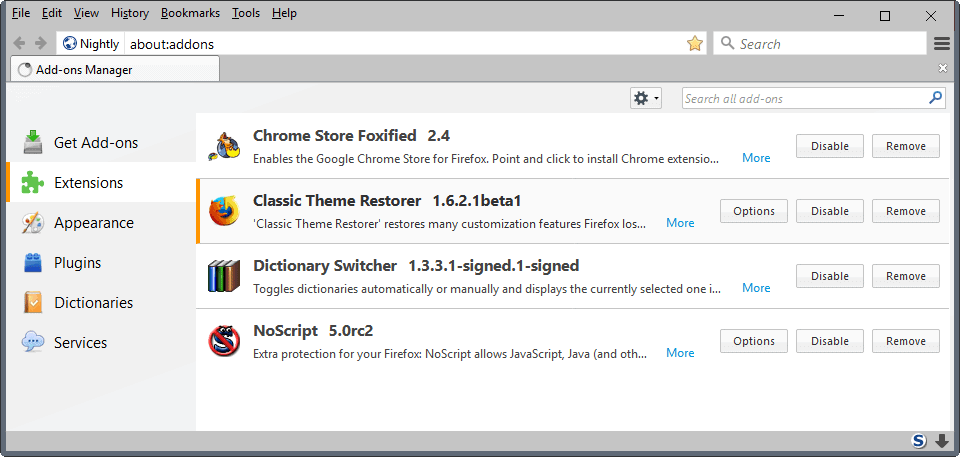Firefox Add-ons Roadmap for 2017

The year 2017 is an important one for Mozilla and Firefox. Multi-process will be enabled for all users of the web browser, sandboxing is introduced, the first bits of Project Quantum are integrated into the web browser, and the add-on system will be switched exclusively to WebExtensions.
Mozilla revealed an updated add-ons roadmap yesterday that highlights major milestones on the way to making Firefox WebExtensions exclusive.
We talked about Mozilla's plans for Firefox in this regard before. WebExtensions is a set of APIs that developers can utilize to create add-ons for browsers. Firefox is not the only browser to use WebExtensions, as others, Chrome, Opera and Edge, use the system as well.
That's good for cross-browser development, better for Mozilla's add-ons review process, better for add-on compatibility with future Firefox versions, and probably also better for browser stability.
Firefox Add-ons Roadmap for 2017

WebExtensions is a good addition to Firefox, and most Firefox users who criticize Mozilla are not doing it because of the integration, but because of Mozilla's plans for the browser's legacy add-on systems.
Mozilla plans to cut all ties to those add-on systems. This means that legacy add-ons won't run in Firefox anymore when the plug is pulled.
Legacy add-ons, as defined by Mozilla, are all extensions that are not WebExtensions. This includes anything with XUL, bootstrapped extensions, SDK extensions, embedded WebExtensions, and complete themes.
Language packs, dictionary files, OpenSearch providers, lightweight themes, and add-ons that are exclusively available for Thunderbird or SeaMonkey are not considered legacy by Mozilla.
Any legacy add-on that is not ported by its author to WebExtensions -- if that is possible -- will no longer work in Firefox 57.
A big issue that developers face right now is that WebExtensions is a work in progress. Not all APIs are available yet, and some APIs that are required for certain legacy add-on features may never make it into Firefox.
This has caused some developers to quit development, or paint a grim picture in regards to the future of their add-ons.
The Roadmap
See Firefox release schedule for release dates.
Firefox 53: April 18, 2017
- New legacy add-ons won't be accepted anymore on AMO (addons.mozilla.org). Updates to existing add-ons are still accepted.
- Add-ons may only load binaries if they use the Native Messaging API.
- Multi-process is on by default for all users. Only exception for systems with add-ons that state explicitly that they are not compatible with multi-process.
Firefox 54 to 56: June 13, 2017 to October 3, 2017
- Mozilla launches multiple content process for E10s in Firefox 55 and security sandboxing in Firefox 54. This may impact some legacy add-ons.
Firefox 57: November 28, 2017
- Legacy add-ons are no longer supported. Firefox won't load legacy add-ons anymore. Firefox 57 is WebExtensions exclusive-
- Multi-process compatibility shims are removed from Firefox.
- Legacy add-ons remain on AMO for the time being. Mozilla has yet to announce a deadline for end of support for these listings (the listings may still be updated for instance)
Closing Words
It is too early to conclude how the move will affect Firefox's add-ons ecosystem. Some developers announced that they won't migrate to WebExtensions already, and the same is certainly true for add-ons that are no longer in development but still working right now.
Some of these may be ported by other authors, and there will certainly be an increase of Chrome extension ports to Firefox. Also, most Chrome extensions will work in Firefox eventually when Firefox reaches parity with Chrome in regards to WebExtensions APIs.
WebExtensions will limit Firefox add-ons in regards to what they can do to the browser.
Now You: How do you see this pan out in the long run?






















All my 9 extensions is dead when ending Extension browser UI API.
Mozilla, please write “WebExtensions browser UI API” (UserStyles and UserScripts for browser interface).
I need disable, move elements of interface, adds events like mouseup, mousedown (with event.button == 0|1|2) to any item (bars, buttons, etc.). Run commands from XUL commands list (please convert them to WebExtensions API). “SearchEngines list API” for my Search Engines extension(names, icons, URLs). And couple other functions.
If you do not, why do not you removed from the Internet a DIV elements and the CSS?
Make manifest file with parameters like “page menu with hamburger,” “snap type page” etc. A CSS leave only change the colors.
Each should be enough …
Why not?
It would be quite consistent.
NoScript will have WebExtension with version 5.0 see https://noscript.net/getit (Development version) site.
Oh, I am so disappointed about webextensions! I develop an addon for Firefox and to keep it up to snuff for multiprocess Firefox, I was updating it to use the SDK and even make it restartless. It takes a long time to develop an addon. There’s no way I can convert this to webextensions. It took forever to get my head around the last change in API. I might just quit altogether and go live in the woods. Or at least I’ll move to Pale Moon. But what about the addons repo? Right now Pale Moon gets its addons from Firefox’s repo – that can’t continue if Mozilla won’t approve non-webextension addons. Pale Moon will need to do something different, too.
Many Firefox extensions still work in Pale Moon out of the box and Pale Moon users get those from Mozilla’s repository, but the Pale Moon site has its own section for extensions specifically adapted to or designed for Pale Moon:
https://addons.palemoon.org/
Click on Extensions (right below the moon in the Pale Moon banner) and choose a category:
https://addons.palemoon.org/extensions/category/alerts-and-updates/
https://addons.palemoon.org/extensions/category/appearance/
https://addons.palemoon.org/extensions/category/download-management/
https://addons.palemoon.org/extensions/category/feeds-news-and-blogging/
https://addons.palemoon.org/extensions/category/privacy-and-security/
https://addons.palemoon.org/extensions/category/search-tools/
A lot of the listed extensions are hosted externally, but some of them are hosted by Pale Moon.
I use almost 60 extensions in Pale Moon. The great majority of them are still straight Firefox extensions. (Sometimes you have to use older versions, dug out from the extension’s complete version history, which you can get to from the Version Information dropdown toward the bottom of the extension’s main page.) However, a very slowly growing number of my extensions are Pale-Moon-only forks or workalikes (e.g., Encrypted Web and MozArchiver). I understand that it’s not that much work for developers to adapt old-school Firefox extensions to Pale Moon, so I would hope that the number of ported and forked — and original! — Pale Moon extensions will increase when Firefox stops supporting XUL/XPCOM.
Mozilla – has one big problem!
The issue is that they are always in attack mode and are willing to fight! They are doing that since day one. Mozilla tried to fight against IE and have been able to break it’s dominance a bit with useful and cool features.
The Chrome arrived. Moz tried the same strategy too, but it was not working as it used to work in the past. So they have been thinking about something else. Beat them with their own weapon. If Mozilla would walk away from their attack mode and would accept things as they are, it would not have ended like that. But their latest plans/goals are also a total failure. So why still going on with that. Moz had a nice market share during Firefox until version 20 or something like that. Enough to shove it into Google’s face and make them realize that they are not winning to 100%. But even that was not enough for them. Moz wanted to become number one, no matter what it has to be done to reach that goal. For this they are sacrificing user’s interests.
History has showed it that crusades never will lead to success. We had already crusaders being beaten up for being ignorant and power hungry. And that’s what Mozilla is facing too. They are crusaders on a conflict for influence and breaking the dominance of Google Chrome. But if they betray the own user base for this fight, they are nothing better than the enemy Moz want to take out.
Learn history Mozilla, we already have been there. Crusades never will lead to success. We had a believe driven crusade which failed. We had a war driven crusade which failed (luckily). What makes you believe that you win your crusade?
Why not call it the “Firefox Death Roadmap for 2017”?
ChrOpera/ChromeFox finally became lapdogs of Google Chrome.
Does anybody knows if Cyberfox keep legacy addons? Also, anybody knows how to make Flash work in Cyberfox? Not just activating it manually, but make i work reliably. Activated Flash freezes my Cyberfox every time, even on clean profile.
Cyberfox has its forums where you should fine answers : https://8pecxstudios.com/Forums/index.php
The topic opener from the Mozilla blog officially admits it more or less: Our beloved UI customization is almost not existing anymore.
Well, luckily there are enough fitting replacements for Firefox.
https://blog.mozilla.org/addons/2017/02/16/the-road-to-firefox-57-compatibility-milestones/#comment-223542
I agree Lestat. “This is not about breakage – You do not want to support features like that any longer.” as Danny says. It’s not even really about security (“that’s not the main reason that UI customization is being significantly restricted” – Jorge). They just want to reduce maintenance and end users be damned.
The same could be said for the WE API, which we still don’t know what it will end up like, but is bound to be less functional – they just want to keep it as simple as possible to reduce their work.
Maintenance is a reason, but not the biggest. The thing is simple users present the biggest part of the market share. Chrome owns the largest percentage of the market share.
So what do companies do which try to gather a large part of that users too? They restrict and remove features from which they know that simple users are not going to accept them and refusing to use a browser with such features inside.
Opera has done it. Mozilla has done it. Even Microsoft has done it partly with Edge – even if they can’t remove much features as they do not had many in the first place. Everyone adopts that new simplicity trend because big companies show that they earn that way money and gather large influence. Even an Open Source company like Mozilla is not willing to ignore that.
Ask a simple user if he would use a software with such features inside. The answer is a clear no-brainer. And what are you doing then to gather that users? Kill features and restrict the feature set until a point that these users switch over.
Saved money is a nice side effect, but not the main reason of all that. Like it or not, we experience a 180 degree shift of priorities. And in most cases advanced users are the one’s who lose everything as it is not possible to earn enough with users like us today.
Sadly, I have moved from FF and PM to Chrome because it really is a better browser in so many ways.
Yes, you can wear your tin foil hats if you wish. But Mozilla is going to kill FF and PM is alone on its own island.
Go ahead and troll away.
Why the heck are they trying to reinvent the wheel ? They had a good one running before they turned it into a square. I honestly do consider all of this silly stuff made by geeks who live in their own little binary world. And who has the time to follow all of this and the new reappearing security and privacy issues ? This junk is not a relieve but a burden.
Because they had to redesign their addon model to accomodate their new multiprocess model, and their is great value in implementing multiprocess. Even if you don’t personally see it.
I’ll switch to Vivaldi if Firefox won’t support the add-ons I like. It’ll be my way of saying I’ll choose something different if Firefox becomes a clone of Chrome.
I don’t have an issue with Mozilla’s direction at this point, they seem to be finally getting back on track after some strange decisions in the last few years.
No issues with the Australis UI, but I prefer the compact themes. Performance wise, I am on nightly running with 8 content processes, so FF runs pretty swiftly (it still has a ways to go to catch chrome, even vivaldi is slower than chrome).
Webextensions are a smart move imho due to needing to be able to port chrome extensions easily (less work for developers), and for reducing the ability to create dodgy extensions. Wish lastpass would, inoreader, and todoist would update theirs to play nicely ;O)
Regarding other browsers, I sometimes use Vivaldi and generally like it, it’s not at a stable point right now though, and it’s not open source. Unlikely I would switch to it over Firefox.
It’s important that Mozilla stays around as an alternative. They already have an uphill battle due to companies abusing their various monopoly’s to get people to use their browser.
Assumint nothing else will change, even without its extensions, I will continue to use FireFox. As already said, since most users don’t use extensions, besides ABP- kind of stuff, which will work with the new extension model, so I doubt this will have a drastic impact on FireFox’s user base. I personally am always turned off by how awful the video decoding is in any other browsers compared to Fx. On YouTube a 1080p60fps video uses 20-30% CPU on Chromium while it sits bellow 5% on FireFox (and its forks). And I care enough about video playback in browser to consider this as one of the main reasons not to switch away from it. Privacy is another factor to consider, not only from company’s claims, but the ability to disable features that I don’t use which could otherwise be used by others as a tracking mechanism (RTC). As long as the cr.ap (which otherwise characterises the entire platform) that is on the iOS “browser” (and I use this term loosely due to aPple’s policy on browsers) does not make it’s way on desktop it should be fine.
I would like to know whether or not Seamonkey browser will drop XUL too ?
I will probably switch to Seamonkey at least for it’s classic interface if I can’t use anymore Classic Theme Restorer.
If they keep legacy feature add-on it would be good replacement for Firefox.
“I would like to know whether or not Seamonkey browser will drop XUL too ?”
I’d like to know that as well. It’s a nice browser.
As far as I can tell, SeaMonkey is using the ESR version of Firefox so if Firefox ESR jumps to only WebExtensions and no more native Gecko Add-ons.
Then R.I.P SeaMonkey.
Mozilla becomes Firefox undertaker.
I was never fan of Chrome like browsers. If Firefox becomes locked as Chrome regarding addon settings, Seamonkey will be my first alternative otherwise it’s Palemoon.
I hate this simpler browser look which make people become noobs without possibility to change anything.
Really shitty Google.
@nonqu
I did check FF 3.6.28. And I can’t see any setting which is not available in recent FF, and I’m not saying about ones given through about:config, but ones in options – for casual user. Except whole australis thing, but come on – even australis user interface can be customized to some degree, and secondly there are extensions like classic theme restorer. Would you please point out which setting is not available then? The “depressing and dumbing down ones” ?
That is not an “updated roadmap”. It’s merely confirmation/formalization of the disaster ahead that was already known.
A genuine roadmap would include tactics planned for mitigating the impact of these fundamental changes on users and, in particular, the hugely insulted and abused poor sods who make the effort to support Firefox and it’s users, but are then SHAT ON by idiotic Mozilla management. Those being, the hard working and easily dismissed by Mozilla management, add-on developers.
Surely there must still be some good engineers at Mozilla that can undertake the mutiny against management that is so glaringly necessary?
I must admit that I don’t understand all this animosity. Even with just web extensions Firefox will be Firefox aka the only completely open source browser. Why is Chrome winning by default?
Perhaps a WebExtensions extension can be made to add support for the legacy extensions.
That’s unfortunately not feasible. It’s like pouring water from the whole lake into a 1l bottle and expecting it to not spill. Webextensions are just a set of limits compared to XUL.
Could someone please explain the difference between :
> Legacy add-ons are no longer supported. Firefox won’t load legacy add-ons anymore. Firefox 57 is WebExtensions exclusive.
And :
> Legacy add-ons remain on AMO for the time being. Mozilla has yet to announce a deadline for end of support for these listings (the listings may still be updated for instance).
Which are supposed to happen at the same time.
Legacy add-ons will stay on AMO but will be uninstallable on FF 57+
Thanks.
So the point is to allow users to download them, provided they lock their Firefox to an older, obsolete version, right ?
I think the main point is to give authors options to update the add-on profile pages after the switch to WebExtensions exclusivity. Also, Firefox ESR will support legacy add-ons for longer.
I can only agree with Earl. Firefox will become irrelevant if it can no longer offer more powerful extensions than Chrome. If Chrome API parity level is Mozilla’s goal then so be it. Nobody needs a carbon copy of said browser. Nobody. Opera already did it. See how it ended up for them? Did they grow in numbers? No, they lost tons of users after the Opera 15 debacle. I hope Gecko survives for the sake of diversity of different rendering engines. I wouldn’t like to see WebKit and Blink solely dictating the course the web is taking. I hope somebody forks Firefox 56 or whatever the last XUL build will be called like and moves on. What happens to Mozilla is of no importance to me from this point going forward.
PS: For everybody mentioning Pale Moon here, I don’t think one guy can cope up with the development of an entire browser. He definitely needs support in order for his product to survive.
“Firefox will become irrelevant if it can no longer offer more powerful extensions than Chrome.”
But they *will* offer more powerful extensions than Chrome. WebExtension’s premise is to reuse Chrome’s extension APIs, but offer more powerful options on top of them. The practical upshot is (theoretically) that all Chrome extensions will run in Firefox, but not all Firefox extensions will run in Chrome.
Even Otter can go on. Even Qupzilla can go on. The benefit of Open Source projects is everyone can take over in case if the origin guy steps down.
Take a look to Mozilla. Have you ever guessed that they remove all advanced users features? Even with a large group you have no 100% certainty anymore.
So, it really does not matter what browser you are using. Because with every software you could lose everything at every single moment possible if they have a shift of priorities, do not have enough money anymore or whatever for other reasons.
I think it helps if you take a step back and look conceptually (see the woods for the trees), and even put yourself in the other person’s shoes (yup, mozilla is not a person, it’s a phrase). Not saying I agree with the way WE will be implemented, and the raw deal a lot of (well, all really) developers are getting – or the fact that we don’t know what we will eventually lose, except to say that we will lose something – it sucks.
Mozilla will have metrics / telemetry. Without looking them up, for starters isn’t something like 50% of users running FF without any extensions. Add in a pile more with 1 or 2 that are compatible .. and maybe 70-80% of users will be totally unaffected. And a large portion of the rest will adapt and not really mind.
Looking at it from another angle .. lets say they have 500 million users … the biggest addons (excluding Adblock Plus at 20 million) start at 4.5 million ( https://addons.mozilla.org/en-US/firefox/extensions/?sort=users ) and drop rapidly. Some of these will port for sure: AdBlock Plus (1), uBlock Origin (3), NoScript (5) and after that we’re rapidly falling into less than 0.2% (1 million) users per addon (assuming my base 500 million which I’m sure I read somewhere recently as a good figure).
I think you vastly overestimate the impact this roadmap will produce. “Advanced/power” users and the developers of such addons that offer functionality not granted by other browsers, are few and far between .Firefox will continue to flourish, and indeed I believe will grow, for different reasons. These reasons being that it is the only browser that really cares about privacy, and the world is becoming more and more privacy concerned. I also think once the e10s and sandboxing and process per tab finally land, that will also be a boost. And then there is the servo/qauntum/rust whatever thingie – where I can see FF becoming the so-called fastest, most secure, most customisable, and most private mainstream browser.
That said, don’t get me wrong. I think the handling and timing of the move to WE sucks a lot, and only time will tell just how much functionality is lost or restricted.
Probably another “only browser” chinese product at the end.
@Pants: The only browser installed on my side is Pale Moon, others are portable. BY DEFAULT no Suggested Tiles based on your history, no hidden telemetry etc, with some buttons to toggle on/off some features like dom.storage etc. The goal of Portable’s Browsers is for google’s things or few other sites thinking my browser is not “decent” like WeTransfert (yes some arrogant devs around that world). Why I was interested by this article? > the main reason was my insatiable curiosity, I like deadlines planned conscientiously, the other “the only browser” that shocked me, that’s all.
JFI about history: (http://www.business-standard.com/article/beyond-business/anonymous-browsing-habits-may-give-away-your-identity-study-117012000672_1.html)
@Anonymous: “I’m glad you can predict the future”… “but I fail to see how this has anything to do with the discussion” – Well, I was specifically referring to your quote about your browser being more secure (than mine) in the future and mentioned that there are other factors other than a browser. I wasn’t talking about the roadmap :)
And absolutely, no disrespect taken, use whatever you like. Don’t get excited by the roadmap (I’m not). I’d also like to say, sorry that FF is freezing on you. For me, its the opposite – about 1 FF hang a year if that, while Chrome and Opera freeze frequently (every f..g day if I leave them open and idling), and (on Windows 7) the last chrome.exe (or opera.exe) can’t be killed by task manager etc. Not even a log off and back in fixes it. I have to reboot. So horses for courses :)
–well come on then–
I’m still interested to hear why your unnamed browser (by default – so in default mode then) is so much more private and secure than mine (“your baby” – so my current FF setup with the user.js and some add-ons then)?
“By default and concerning privacy, my browser is more secure that your baby, so far” – that’s what you said.
If that’s true then please, I’m on board .. give me that sucker. NOW. And I hope you don’t mean TOR.
@Mikhoul
“Very wrong and short-sight analysis”. Well, it’s an opinion with some arguments. You may not like it, but that alone doesn’t make it wrong, and your individual experience doesn;t make it wrong either. It’s also a discussion, and you make a very valid point – the impact of professionals/geeks/family on others is certainly more than 1install per unit – but I could counter that not all of them will abandon FF either – as others have said, where will they go? Earl mentions FF “built on the backs of core users who installed add-ons–in bunches”, and that may be very true (I think it is to a degree), but we are not living in the past, we are looking at the future.
If those geeks installed FF, why are installations of add-ons so low. Surely they would have set their clients up with some add-ons? And helped maintain them, right? After the top 40 add-ons, we dip down to less than 400K users per add-on, which based on 500 million users is less than 0.8%. If all the contribution of people like yourself (and me too, I make my mom and a dozen clients use FF as well) was of such profound depths, then I would expect this to be a lot higher. I would expect a lot of these “newbies” to be set up and forgotten. IIRC, FF market share has been climbing (sure it’s not what it once was) and is trending in the right direction. This despite people frequently saying they will leave etc, which being on a tech site with FF articles we see disproportionally, due to large number of tech literate people.
Mozilla doesn’t have/use the tactics/clout to sneak/advertise/badger Firefox onto people’s machines like google, but despite this is a well-known brand, is growing share again, and the changes are long term and a long time in the works (yup, sucks about reducing add-on functionality, not arguing about that).
It also takes massive numbers to change market share. Do I think FF will take a hit with FF57 and WE only? Yes. Do I think they will take another hit with the end of the last ESR supporting XUL? Yes. How big will those dips be is anyone’s guess. Do I think they will sustain long term damage?
Ah.. this has anything to do with the discussion too, but since long time I abandoned the buggy Thunderbird (like its author,) to FossaMail too. Wonder what is the Thunderbird Addons Roadmap however?
Very wrong and short-sight analysis: “I think you vastly overestimate the impact this roadmap will produce. “Advanced/power” users and the developers of such addons that offer functionality not granted by other browsers, are few and far between .Firefox will continue to flourish,”
Power users like me have installed many hundred of Firefox instances on computers and since my work involve counseling which browser is the best to use, it’s easy for me to state that I have put Firefox in the hand of at least 5000 users through the years.
What happen since last summer is that I migrate slowly my users to Chromium and when I wll have decided which fork I will use I will bring them with me. It’s more easy for me to maintain just one browser than many, so as soon I will have made my choice within a year few thousands of my users will migrate to let’s say Vivaldi.
Once back at their home, they will download Vivaldi use it like in their work and let Firefox vanish in their computers. When somebody will ask them which browser is the best they will say I use Vivaldi since it’s now better than Firefox.
It is like that you gain market-share, that’s for the same reason IE/Edge never gain big market shares since not a lot of Power Users use it.
Like others are saying, most users don’t really care about which browser they use, in fact a lot of them don’t ever know. They use what they are told to use by the power-users AKA IT from their workplace or what the Tech from the computer shop tell them it’s the best to use.
Mozilla is alienating power-users and devs saying there just a small percentage of market share, it’s pure foolish, it’s like saying The roots of the big tree are counting for just 3% of the tree I can afford to lose it I will retain 97% of the tree, try to remove the roots from a tree and let me know what happen ?
Regards !
@Pants: “I’m glad you can predict the future”… “but I fail to see how this has anything to do with the discussion”
We are talking about the end of 2017 here, the future where a browser (the best for privacy) will force you to buy a gaming machine running Windows 10 just to play with the go-back button to have better suggestions or what else.. Sorry if the Add-ons Roadmap failed to really interest me but I have other more important problems concerning Firefox, on my configuration it is the only browser freezing, hanging etc, contrary to others running perfectly like Pale Moon, Chromium etc. No disrespect but in these conditions why I should waste my time trying to adjust your user.js to have a fully working browser already not working without, I wonder.
Switching to Chrome out of principle, that must be some tough shit principles you have there.
Also, ain’t Opera linked to Chinese government now ? China is cool, Chinese government not so much.
When Firefox 57 hits, if even a single of my addons break, I’m switching to Opera and switching all workstations in my family and companies I do IT for to Chrome out of principle. I hope I won’t be the only one. You’re right that normal users don’t care what browser they are using, but it’s the power users who do configuration on their PCs.
> No Mozilla don’t “really” cares, Mozilla is making things more and more difficult for the average user.
Privacy wise, that couldn’t be more wrong. Other topic wise, I’d say it’s wrong because our definition of average user is power user. Some power users will have to change their habits as add-ons die and others are born. Lessee how disrupted I’ll be.
Probably not much. Pants has about 50 add-ons installed, he’ll be more disrupted than most of us. Yet, he’s pretty much positive about the global picture and I agree.
At least the options exist, and that’s the point I am trying to make. The sheer number of options shows Mozilla does care.
I do agree that the options interface lacks a lot of settings (but TBH, not much has vanished from it over the years), and they did remove about:permissions. While I can see the need to simplify, larger text, etc for touch devices and smaller screens, that does kinda suck, and yes, I wish they had many more of these for the 95% of users who never go to about:config. But I don’t agree that Mozilla is “making things more and more difficult for the average user” – if anything, it has pretty much stayed the same for years.
–about that user.js—
Without trying to separate “privacy” from “security”, because there is usually some cross-over, the user.js has some 28 hidden prefs. It annoys me too that they are hidden in about:config. They are not hidden in discussions or in the open source code of course. I’ve read bugzilla tickets where its been discussed that they “need” to hide it from “idiot users” (my words). I don’t think that it is driven by Mozilla policy, rather an attempt by various coders to protect the average user.
As for the rest of the prefs in the user.js, there is a lot listed (416 active) for several reasons. Not all are changed from default (I would have to check them all one by one to work out how many I actually changed). A lot are by definition “unnecessary” but are included for completeness, or for future proofing, or they can even “speed up” FF a fraction. And regardless of the default setting – an out of the box FF is like any other browser – it MUST be compatible and work for everyone. That means gamepad API, webGL, webRTC, and a raft of other items are all ON by default just like any other browser. No company will willingly have these off by default.
The whole point of the user.js, is to be comprehensive (it’s also there for reference and as a template) and to enforce settings even if they are the default – maybe FF will flip them, maybe you will change them in testing. In fact, the sheer number of preferences that can be tweaked only goes to show just HOW MUCH Mozilla has enabled the ability to customize – and a lot happen to be related to privacy/security/fingerprinting, because this is merely a reflection of the way the internet has evolved (there are some 3000 prefs in total BTW).
–please enlighten us–
“By default and concerning privacy, my browser is more secure that your baby, so far. And in future even more.” – good for you, and I’m glad you can predict the future or indeed see my setup and multiple profiles, but I fail to see how this has anything to do with the discussion. A browser is not the ONLY thing to secure or tweak, or indeed even use. For sure, custom builds can be whatever you like – but the ghacks user.js is a limited and generic but comprehensive list for Firefox with as little site-breakage as possible, not a one-off super-hardened bastard of a thing – which it can easily be. That said, it still relies on addons, and other products/protocols/services and OpSec etc.
If you would like to share why your browser setup is so good, please do. I’m sure everyone here would like to learn how to get better privacy than they currently have. I know I do.
@Pants: “about:config tweaks”: if Mozilla wanted to make it easier about privacy, why according to your user.js more and more hidden prefs you decided to turn off? No Mozilla don’t “really” cares, Mozilla is making things more and more difficult for the average user. By default and concerning privacy, my browser is more secure that your baby, so far. And in future even more.
“”that really cares about privacy”, if you say that its probably true” – sorry, I’ll rephrase that
“that goes far further than any other browser concerning privacy”. While I wasn’t clear, I was talking about mainstream browsers. If you tell me Chrome “really cares about privacy”, I think I’ll explode and die with laughter. Safari I’m not qualified to talk about. And Edge/IE .. enough said. Now lets look at some others: Opera added a VPN, and of course PM cares about privacy. Yet to see anything come out of Vivaldi yet, but I haven’t checked it in depth at all. I thought the word “really” would have been enough to qualify the statement.
Show me a non Mozilla browser that allows SSL Session ID blocking, or has BUILT IN anti-fingerprinting, or any one of dozens of other options.. the sheer number of about:config tweaks that can be done for privacy says it all (and I think I’m qualified just a little to talk on that subject). No other browser comes close. While a lot of these privacy protections are off by default, at least the ability to change them exists. And the source is 100% open, and seriously .. it’s the choice of TBB. Do you think all those people at TOR are unqualified and biased as well (although they made their decision many years ago)?
I can’t speak for Mozilla themselves (and the Focus 3rd party telemetry is a slight worry as is it’s default opt-in) but at the end of the day, there have always been (and will probably always be) off switches – otherwise they would be called out extremely quickly
And yes, I am a fan of FF simply for that ONE reason – its highly configurable. I do use other browsers, and like any software, all of them have pros and cons, depending on your needs. I’m actually really starting to like Opera – is it OK with you if I can be a fan of more than one browser? Please? Pretty please?
“These reasons being that it is the only browser that really cares about privacy”.
“that really cares about privacy”, if you say that its probably true.. being a fan of Firefox is ok, but saying it “is the only browser” trying to protect privacy discredits you as impartial “tester”.
A very objective analysis, Pants. I agree.
There is one caveat though; This all depends on whether or not Mozilla really does care about user privacy. If that is a true mantra, and not just marketing fluff, then you are spot on.
I also agree that privacy is already a big issue. It is with me, that’s for sure. I want/need to use the internet. I also want/need my privacy. I don’t particularly want to become an “advanced power user”, but I will, if that’s what it takes to secure my privacy. I’m not afraid of change, not afraid to learn or try new things. Sure, I can see where it’s frustrating for developers to lose functionality, especially when the change seems to be implemented in such a way as to come across as, shall we say, “uncaring”. For me, it’s all about the privacy. If you made a browser which guaranteed my privacy with no additional tweaking/extensions/etc. required, I’d jump ship. I’m not nearly as invested as a Mozilla extension developer.
Still, I admire the power users, and I/we NEED you guys/gals. You keep the marketers honest. You have the chops to test and/or validate their claims. For example, Mozilla can claim that it cares about privacy, but how do I know it’s true? Because I can load Ghacks.net and find smart young people (with handles like “pants”:-) who have the technical know-how to verify. And y’all will call them out if they lie!
I like Firefox, I really do. If y’all tell me it has become a load of crap, and y’all move to something else, I’ll be smart and follow. For now, I see Mozilla Firefox as the browser most likely to meet my needs, today.
Bottom line: It’s OK to be a fan, it’s OK to get invested with a product (time spent becoming an expert or power user, and money spent supporting the product). Fine and Dandy. Just be ready and willing to change if it all goes down the crapper. Life has a way of doing that sometimes!
Regards,
Mr. Joey
I disagree. As statistics show, most users do not use extensions at all, or use a minimum set of few popular ones. And the latter are/will be ported to webextensions. In case they’re not, a skilled user (aka WebExtension Superhero;) who lacks that extra funcionality will step up and write a new one.
And I’m not convinced that fiddling with webextensions and xul by Mozilla discourages people from using it – at least the masses. Power users – probably yes. But in this case I see such power user who says “f** it, i’m done with firefox” as not consequent one, because where shall he go then, chrome? Where addons are even less powerfull? Whatever you say on Firefox and Mozilla, it still cares for things like user privacy. I cannot say that about chrome or other chrome based browsers, that seem focused on features.
What has been said a lot of times, google “steals” a lot of browser share market by aggressive marketing and bundling chrome with powerfull/popular software (adobe, antivirus suites etc). And first of all, they OWN internet in so mamy areas that it’s simply easy to promote chrome. My guess it’s a completely other story for Mozilla.
Palemoon – I’d like to point out that it’s not one guy. And so far they do keep up, even surpass FF in few areas.
> And I’m not convinced that fiddling with webextensions and xul by Mozilla discourages people from using it – at least the masses.
The masses don’t give a fuck what browser they use, this is why Chrome is that widespread (because back then they installed it like malware).
The driving force for Firefox are the power users, those push FF to PCs of relatives and friends. The power users are the ones that make the great addons that even normal users use.
When you loose the power users because you completely destroy their addons, you have lost the only guys standing up for your product. The product then dies or vanishes in the unimportance.
re: “most users do not use extensions at all”
That “statistic” doesn’t mean what you think it does. Firefox’s market share was built on the backs of core users who installed add-ons–in bunches. We promoted and proselytized Firefox to everyone we knew (and to some we didn’t know). Those who never really got the idea of add-ons (like Mozilla of late) and didn’t install anything to get extra functionality really don’t care what browser they use. To them a browser is a browser is a browser. They’ll use whatever’s handy (whatever comes with the system they’re using probably). Without those core users, Firefox is doomed to fade away… and few will mourn its passing (though many will mourn the loss of what it once was).
By 2020 Firefox will be “abandoned software” because the huge majority of those who used to use it will have moved on. There won’t be many new users. Developers will have little interest in working on a project with a less than 1% market share.
I AGREE !
EVERY Time THEY MAKE A CHANGE ……. I LOOSE MY PASSWORD APP !
THEN …. JUST LIKE TODAY …. I HAVE WASTED 2 HRS TRYING TOO GET IT BACK !
NOW I CAN;T LOGIN ON FOXFIRE & I KNOW IT BY HEART CUZ I HAVE HAD TOO DO THIS SOOOO MANY TIMES!
i’VE USED THIS PROGRAM 4 LIKE 10 YRS & LOVE IT !!!
STOP FIREFOX !!!!!!!!!!!!!!!!!!!!!!!!!!!!!!!!!! BA BYE
CUZ U DO NOT RULE EVERYTHING!
“Developers will have little interest in working on a project with a less than 1% market share.”
By that logic no one would be working on any desktop Linux project (distributions, desktop environments, window managers, file managers, terminal emulators, etc. etc. etc., each of which has way less than 1% user share).
As things are going by 2020 I’ll be running Pale Moon on a Linux OS.
@Garou, it won’t make me unique. Fingerprinting is a true science and has to be understood for what it is, what it means and not as a new privacy fashion which would consider it’s power as able to identify. That the stakes be 100,000:1 or 10,000:1 that I am the King of Suede won’t spot me as such. IP will, not plain fingerprinting.
Yes, I care for privacy, not for secrecy. Should I go to the end of my thought I’d say, what the heck if the information concerning my IP is known and processed IF it leads to no possible ad delivery. since I have an anti-ad system preventing all ads : all means not one ad when I surf. As all of us I have my secrets and those are never — never — mentioned, neither any related info which, added to another related info would draw a perspective. That’s my border-line. I even happen to let go false data and later on related false data for the pleasure of redirecting any possible profile about myself which could be active (I have no idea).
But why not try to do a little better than sticking to a border? Even if ads don’t make their way to my devices why not give a kick to all data collectors I can run into? That’s what I do, as many of us. But not to the point of choosing a browser, a computer environment on the basis of its similarity with a majority. it all ends up to probabilities. As always, try to know what others know about you is a necessary condition to keep your privacy. If moreover you aim secrecy than try to know things about others without them knowing you know it. That’s art, and i ain’t no artist (or am I?).
So, Pale Moon on a Linux system and I’ll be sqeezed among 10,000 rather than 100,000. Wow, should I take the chance?!
That will make you amazingly fingerprintable though :P (Since you care about that)
Les grands esprits se recontrent !
So where would those users go? Chrome/ Vivaldi, browsers with WebExtensions? Or Palemoon?
Also, userchrome.css isn’t going anywhere.
I read Jorge and dozens of bugs. The only thing that’s certain is that UI customisation will be less than current Firefox, but there’s a whole realm between current Firefox and anything else, so: We’ll see.
btw, API is already more flexible than Chrome’s.
Also, customisation goes beyond UI, there’s a thousand preferences to configure. When someone asks about something they’d like to do with Firefox, half the time a preference can be flipped to get it, and the other half there’s an add-on for it.
Give it until November 2018, a year after Firefox 57, and we’ll see if that’s still the case or not. Nobody knows the future.
Mozilla said they do not want to support a deep going feature set anymore. Even Jorge has made it clear. So all your customization options you mention will only be crippled and never be able to be a real replacement of XUL.
Mozilla does simply not believe in customization anymore. Only dreamers can believe that Mozilla still values power users.
All facts and all actions which happened since Australis go into the opposite direction. Anyway, i am happy that i have nothing to do anymore with Mozilla. That organization has lost my respect when they crippled all the built in features in version 29. I do not want to have outsourced customization, i want them built inside.
Even if Webextensions get a bit more enhanced, they will always suck if compared to XUL extensions. They will never be as powerful and mighty or capable.
Vivaldi’s UI is “fully customizable” through CSS.
Firefox already has or will have
-> userchrome.css
-> WebExtensions UI related API
-> browser.html
I tell you, Firefox will remain more customisable than Vivaldi. We’ll see again what it is in 2 years, then you can look back and decide if you have to eat your own words or not :)
stud Vivaldi is full of UI customization features – When Firefox dumps XUL and loses most advanced customization features, Firefox is much less customizable than Vivaldi. Vivaldi shows that you can also keep and add customization features in a non XUL browser which are almost as great as XUL was. Also you can rewrite the whole Vivaldi UI from scratch if you want on your own.
After XUL is gone, something like that is not possible anymore in Firefox. So, no, Firefox without classic customizable UI and full themes and only a bit advanced webextensions is far less customizable than Vivaldi.
And… i am already using and keep on using Otter-Browser:
http://otter-browser.org/
and just for fun checking out http://qutebrowser.org/ which is a highly interesting project too.
> So where would those users go?
They can go to Firefox if customization is their concern. I bet my left shoe that Firefox 57 will remain more customizable than Vivaldi.
The concern for people is add-ons in this case, and what add-ons do is customization, whether it be feature or UI customization or what have you. So if Firefox 57 is more customizable than all non-Firefox browsers, it’s still the best at add-ons…
Vivaldi is going to be my choice of browser when the times comes in November.
But it needs more work, in many places you still see Chromium UI elements.
Vivaldi out of the box provides a lot of features that I have use addons for on Firefox. So I’ll be migrating to Vivaldi. On top of that Vivaldi has an actual settings page, unlike Firefox, which removed most of it’s setting available in 3.6 between 4.0 and Australis.
Seriously, go check out the preferences menus in Firefox 3.6 portable:) The amount of setting we had to learn to live without is depressing. The are gradually dumbing down the browser to the level of Chrome.
Or Palemoon? > Pale Moon.